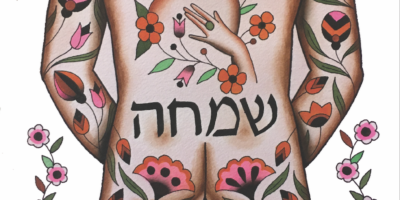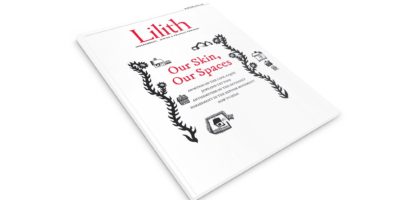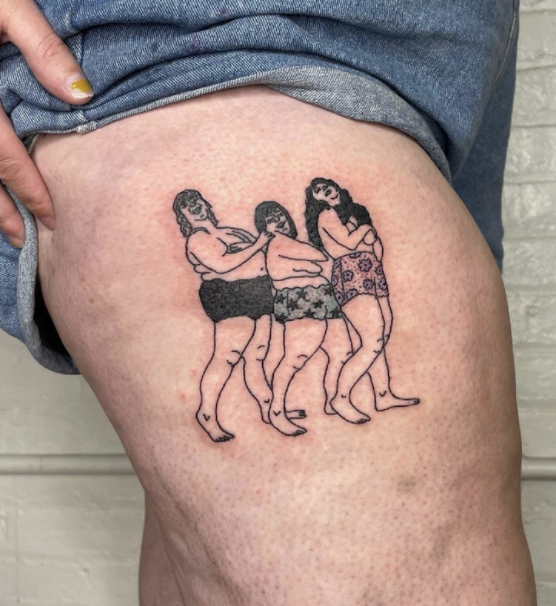
Jewish Tattoo Artist Spotlight: Ella Sklaw
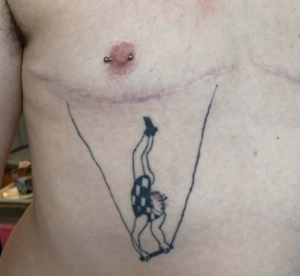
Tattoo by Ella Sklaw from Instagram (@sklaw_ )
Located in Brooklyn, NY, Ella Sklaw is a community-taught tattoo artists who discovered tattooing through a love for drawing and illustrating. They work in the flash tattoo format (meaning designs are pre-made rather than created by the client) and they cater primarily to the queer community, seeking to provide a medium for self-love and expression. Ella talked to Lilith’s Arielle Silver-Willner about Jewish identity, artistic inspiration and the queer community.
What made you fall in love with tattoos?
I found that tattoos had an extraordinary transformative power in my relationship to my own body. At that point I was doing a lot of painting and illustration for fun and I figured I could find my way into tattooing. I got a lot of tattoos and asked lots of questions. I connected with tattooers online. Then I gave a lot of very terrible, cheap tattoos until I figured it all out. The key for me was having a distinct drawing style that folks connected to.
Your designs have a strong sense of style—they’re playful yet grounded in meaning. Tell me about the themes and inspirations that anchor your work.
I focus on birds and acrobats because of my love for my late grandmother, Judy. She loved birds, and every time I draw one I feel connected to her. She also loved Calder and I have found a little piece of her by exploring his early illustrative work, which is circus themed. My grandma died just as I was starting to tattoo and, as an elderly Jewish woman, she recommended I tattoo leather bags instead of people. Sorry grandma! I do have a tattoo in her honor, it’s on my chest and it reads “matriarch.”
I also focus on radical queer body acceptance. I urge folks to put work in places they hate, to transform their relationship with their bodies.
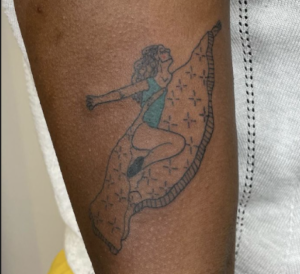
Tattoo by Ella Sklaw from Instagram (@sklaw_ )
What is it about queer folks and tattoos, anyway?
I think queers are looking to belong in our bodies outside of traditional beauty standards. Our whole lives, we’re told we are supposed to be or have or do certain things—be skinny, have straight hair, etc. Tattoos allow for bodily autonomy outside of these traditional standards. At the same time you get to collect art and look amazing. I think wearing a certain style of tattooing signals queerness to other queer folks. Being tattooed by other queers also creates a special space to connect with each other and understand what we need to feel safe and good in our bodies.
Traditionally, tattoos are seen as a violation of Halakhah—What should we tell our families if they’re worried about this?
There’s a defiant spirit inherent to Judaism that I carry with my practice. My tattoos make life enjoyable for me; they helped me find my queer identity and love my body….. Other than that I’m really just a nice jewish “girl” with a lot of tattoos.
What is your favorite tattoo you’ve ever created or received?
My favorite pieces I’ve created are always belly tattoos on queer people, especially on fat people like myself. It’s extremely important for me to use my work to help people feel more at home in their bodies.
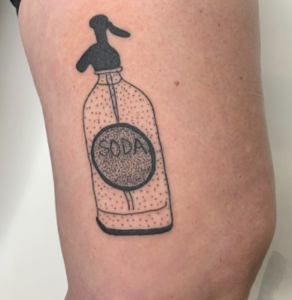
Tattoo by Ella Sklaw from Instagram (@sklaw_ )
If Lilith had a tattoo, what would it have been?
An acrobat belly tattoo!! Everyone looks and feels amazing with an acrobat belly tattoo.

